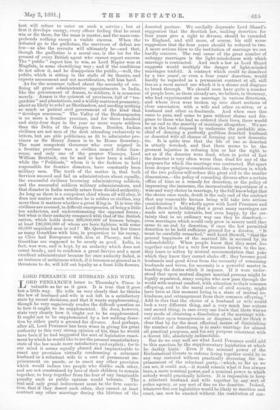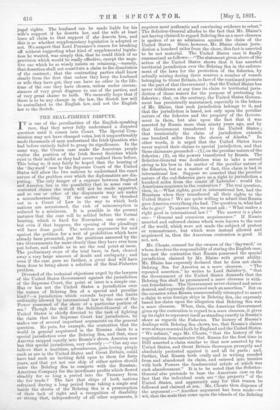LORD PENZANCE ON HUSBAND AND WIFE.
LORD PENZANCE'S letter to Thursday's Times is valuable as far as it goes. It is true that it goes but a little way. He tells us very clearly that he thinks the law of husband and wife is not left in a satisfactory state by recent decisions, and that it wants supplementing, though he very sagaciously evades the difficult question as to how it ought to be supplemented. He does, however, state very clearly how it ought not to be supplemented. It ought not to be supplemented by a law making deser- tion by either party a ground for divorce. And perhaps, after all, Lord Penzanc,e has been wiser in giving his great authority to this very strong opinion of his, than he would have been if he had suggested the sort of legislative enact- ment by which he would like to see the present unsatisfactory state of the law made more satisfactory and explicit ; for to our mind it seems equally absurd and :impracticable to enact any provision virtually condemning a reluctant husband or a reluctant wife to a sort of permanent im- prisonment on parole, or to enact any other provision -which would induce two people who dislike each other, and are not constrained by love of their children to remain together, to keep together from the fear of any imaginable penalty such as public opinion would tolerate. The real and only great inducement must be the firm convic- tion, that if they desert each other, they cannot at least contract any other marriage during the lifetime of the deserted partner. We cordially deprecate Lord Shand's suggestion that the Scottish law, making desertion for four years give a right to divorce, should be extended to England, and still more, of course, his still worse suggestion that the four years should be reduced to two. A more serious blow to the institution of marriage we can hardly conceive. The real cause of the great number of unhappy marriages is the light-mindedness with which marriage is contracted. And such a law as Lord Shand suggests would multiply the danger of light-minded marriages tenfold. A contract which could be dissolved by a two years', or even a four years' desertion, would hardly be regarded as a permanent contract at all, still less as a most sacred one which it is a shame and disgrace to break through. We should soon have quite a number of people here, as there already are, we believe, in Germany, who had experimented on marriage in various directions, and whose lives were broken up into short sections of close association with a wife and other ex-wives, or a. husband and other ex-husbands. And when once this came to pass, and came to pass without shame and dis- grace to those who had so ordered their lives, there would. be an end to the sanctity of marriage altogether. We are• not in the least disposed to underrate the probable mis- chief of denying a perfectly guiltless deserted husband or deserted wife all chance of forming any new domestic tie. It is quite true that the life of one so deserted is utterly wrecked, and that there seems to be the grossest injustice in refusing him or her the right to act as if the deserter were dead, when in point of fact the deserter is very often worse than dead for any of the purposes for which the marriage was contracted. But apart from deeper religious considerations, the question is, which of the two policies will reduce this great evil to the smaller dimensions,—the policy of conceding divorce after a certain efflux of time as a remedy for desertion, or the policy of impressing the immense, the inconceivable importance of a wise and wary choice in marriage, by the full knowledge that the choice once made, death is the only end of the contract that any reasonable human being will take into serious consideration ? We wholly agree with Lord Penzance and Lord Stowell in holding that a great many marriages are made not merely tolerable, but even happy, by the cer- tainty that in no ordinary way can they be dissolved,— even marriages which would only grow in misery until they came to an end by desertion, if once the law permitted desertion to be held sufficient ground for a divorce. "it must be carefully remarked," said Lord Stowell, "that the general happiness of the married life is secured by its indissolubility. When people know that they must live together except for a very few reasons known to the law, they learn to soften by mutual accommodation that yoke which they know they cannot shake off ; they become good husbands and good wives from the necessity of remaining husbands and wives, for necessity is a powerful master in teaching the duties which it imposes. If it were under- stood that upon mutual disgust married persons might be legally separated, many couples who now pass through the world with mutual comfort, with attention to their common offspring, and to the moral order of civil society, might have been at this moment living in a state of mutual un- kindness, and estrangement from their common offspring." Add to this that the choice of a husband or wife would look a very different thing, and a very much less serious and sacred thing, in case every one knew that there was an easy mode of obtaining a dissolution of the marriage with- out either open transgression or disgrace, and we think it clear that by far the most effectual means of diminishing the number of desertions, is to make marriage for almost all practical purposes, and for any purpose consistent with a decent life, absolutely indissoluble. Nor do we very well see what Lord Penzance could add to this sanction by the supplementary legislation at which he darkly hints. Even if the nominal power of the Ecclesiastical Courts to enforce living together could be in any way restored without practically decreeing the im- prisonment of the reluctant party,—which, so far as we can see, it could not,—it would remain what it has always been, a mere nominal power, and a nominal power in which nobody would practically believe. It is impossible to keep a reluctant husband and wife together by any sort of police agency, or any sort of fine on the deserter. Indeed, whatever fine our legislation would be likely to sanction and exact, can now be exacted without the restitution of con- jugal rights. The husband can be made liable for his wife's support if he deserts her, and the wife at least loses all claim to that support if she deserts him, and this is so whether supplementary legislation is adopted or not. We suspect that Lord Penzance's reason for breaking off without suggesting what kind of supplemental legisla- tion he wanted, was simply this, that he could think of no provision which would be really effective, except the nega- tive one which he so wisely insists on retaining,—namely, that desertion shall not constitute a claim to the dissolution of the contract ; that the contracting parties shall know clearly from the first that unless they keep the husband or wife they have got, they can have no other in the life- time of the one they have chosen, unless under circum- stances of very great disgrace to one of the parties, and of very great shame to both. We earnestly hope that if there is to be any change in the law, the Scotch law will be assimilated to the English law, and not the English law to the Scotch.







































 Previous page
Previous page